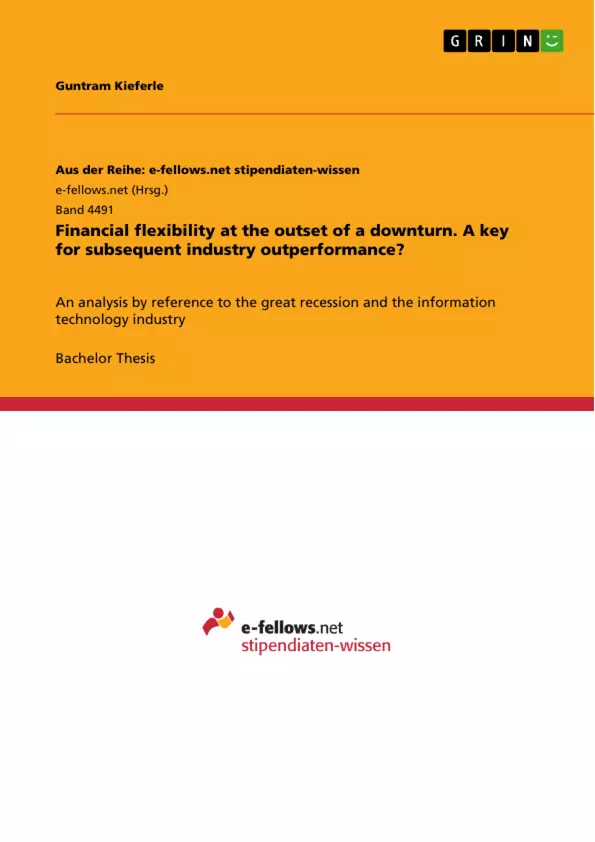The business cycle is a cyclical phenomenon and major concern for all sorts of businesses. The short run alternation between contractions and expansions hurts companies across industries forcing many firms to drastic measures in order to survive. There are companies however that overcome these downturns with a tendency to subsequently outperform their competitors. It is assumed that a good financial positioning of a company right at the outset of a downturn is linked to a higher probability of subsequent industry-peer outperformance. By using ratio based industry-level analyses the author tests the hypothesis that IT companies with a high Financial Flexibility – at the outset of the Great Recession – were subsequently able to perform significantly better than their industry peer. Whereas Financial Flexibility refers to a company’s positioning in terms of current liquidity and its ability to secure new cash through operations or leverage.
Inhaltsverzeichnis (Table of Contents)
- List of Abbreviations
- Abstract
- Kurzfassung
- 1 Einleitung
- 1.1 Problemdefinition
- 1.2 Relevanz der Thematik
- 1.3 Forschungsfrage
- 1.4 Aufbau der Arbeit
- 2 Theoretischer Rahmen
- 2.1 Konjunkturzyklus
- 2.2 Finanzielle Flexibilität
- 2.3 High Performance Business
- 2.4 Die Weltwirtschaftskrise 2007
- 2.5 Die Informationstechnologieindustrie
- 3 Methodik
- 3.1 Stichprobenauswahl
- 3.2 Datenerhebung und Datenquellen
- 3.3 Operationalisierung und Kennzahlen
- 3.4 Hypothesenformulierung
- 3.5 Statistische Methoden
- 4 Ergebnisse
- 4.1 Financial Flexibility Analysis
- 4.2 High Performance Business Analysis
- 4.3 Hypothesentest
- 5 Diskussion
- 5.1 Interpretation der Ergebnisse
- 5.2 Limitationen der Untersuchung
- 5.3 Implikationen für die Praxis
- 5.4 Weiterführende Forschung
- 6 Zusammenfassung und Ausblick
Zielsetzung und Themenschwerpunkte (Objectives and Key Themes)
This bachelor thesis investigates the influence of financial flexibility on the subsequent performance of IT companies during a downturn. The study focuses on the Great Recession of 2007 and uses data from a sample of 100 publicly traded IT companies. The main objective is to analyze whether companies with higher financial flexibility at the outset of the recession were able to outperform their peers in the following years.
- Financial Flexibility and Business Performance
- The Great Recession of 2007
- The Information Technology Industry
- Quantitative Research Methods
- Financial Ratio Analysis
Zusammenfassung der Kapitel (Chapter Summaries)
Chapter 1 introduces the research problem, highlighting the importance of financial flexibility during economic downturns, and outlines the research question and structure of the thesis. Chapter 2 provides a theoretical framework, discussing the business cycle, financial flexibility, high-performance businesses, the Great Recession of 2007, and the information technology industry. Chapter 3 details the research methodology, covering sample selection, data collection, operationalization of variables, hypothesis formulation, and statistical methods employed. Chapter 4 presents the results of the analyses conducted, focusing on the financial flexibility analysis, high-performance business analysis, and the hypothesis test. Chapter 5 discusses the interpretation of the findings, limitations of the study, practical implications, and potential directions for future research.
Schlüsselwörter (Keywords)
The key concepts and terms explored in this work include financial flexibility, business performance, economic downturns, the Great Recession, information technology industry, quantitative analysis, financial ratio analysis, high-performance businesses, and statistical hypothesis testing.
Frequently Asked Questions
What does "Financial Flexibility" mean for a company?
Financial flexibility refers to a company's ability to respond to unexpected expenses or investment opportunities, primarily through current liquidity and the ability to secure new cash via operations or leverage.
How does financial flexibility impact performance during a downturn?
Research suggests that companies with high financial flexibility at the start of a recession are better positioned to survive and subsequently outperform their industry peers.
What was the focus of the study regarding the IT industry?
The study analyzed 100 publicly traded IT companies during the Great Recession of 2007 to test if high liquidity and low leverage led to better performance compared to competitors.
What are the key financial ratios used to measure flexibility?
Common ratios include the current ratio (liquidity), debt-to-equity ratio (leverage), and measures of cash flow from operations.
What are the practical implications for IT managers?
Managers should maintain a balance between aggressive growth and financial reserves to ensure the company can navigate cyclical economic contractions without drastic measures.
- Quote paper
- Guntram Kieferle (Author), 2013, Financial flexibility at the outset of a downturn. A key for subsequent industry outperformance?, Munich, GRIN Verlag, https://www.grin.com/document/270468



